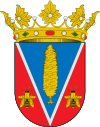Villadoz facts for kids
Quick facts for kids
Villadoz
|
|||
|---|---|---|---|
|
|||
| Country | Spain | ||
| Autonomous community | Aragon | ||
| Province | Zaragoza | ||
| Comarca | Campo de Daroca | ||
| Area | |||
| • Total | 17 km2 (7 sq mi) | ||
| Elevation | 900 m (3,000 ft) | ||
| Population
(2018)
|
|||
| • Total | 88 | ||
| • Density | 5.18/km2 (13.4/sq mi) | ||
| Time zone | UTC+1 (CET) | ||
| • Summer (DST) | UTC+2 (CEST) | ||
| Vehicle registration | Z | ||
Villadoz is a small town located in the province of Zaragoza, which is part of the Aragon region in Spain. In 2020, about 95 people lived here.
The town is nestled near the Sierra del Peco mountain range, offering beautiful natural views.
Contents
History of Villadoz
Ancient Times: Roman History
Long ago, around 200 BC, ancient Romans lived in the area where Villadoz is now. Archaeologists have found signs of their presence. They discovered remains of what might have been a Roman bridge near the Huerva River.
They also found parts of Roman homes, called "villas," in a place known as "Fuente del Manco." A Roman road, which connected important cities like Zaragoza, Sagunto, and Valencia, also passed nearby. Many Roman pottery pieces have been found in the "Fuente del Manco" area too.
Medieval and Modern Changes
In 1248, King James I of Aragon made Villadoz independent from Daroca. It became part of the "Sesma de Langa" within the Community of Daroca's Villages. This meant the town answered directly to the king. This system lasted until 1833.
During this time, the local church, dedicated to Santiago Apostle, was built. It shows a special style called Mudejar Aragonese art. Two small chapels, called hermitages, were also built. One was for Saint Bartholomew (now gone) and another for Mary Magdalene (now in ruins).
19th Century Developments
By the mid-1800s, the hermitages of Saint Bartholomew and Mary Magdalene were destroyed. A new hermitage was built for Saint Martin of Tours, who became the new patron saint of the village.
In 1845, the nearby village of Villarroya del Campo became a neighborhood of Villadoz. However, it became independent again by the end of the century.
The 20th Century and Beyond
In 1933, Villadoz became more connected to the world when a railway line was built. This line linked Zaragoza to Caminreal. Later, it became part of Renfe, Spain's national railway company, and extended to Teruel. By the late 1990s, the line reached Valencia and Huesca.
During the Spanish Civil War, there was an attack on the railway. Sadly, five people were executed on the railway bridge. Four local Falangists also lost their lives.
In the 21st century, Villadoz has been modernized. In 2006, the Mudejar tower of the Santiago Apostle church was repaired. A traditional stone column, called a "peirón," dedicated to the Virgin of Carmen, was also rebuilt. In 2008, a new highway (A-23) was built. A new train stop and a town park were also added.
Local Celebrations and Festivals
Villadoz celebrates several important festivals throughout the year. These events bring the community together for fun and tradition.
- November 11th: Saint Martin's Day
- This day honors Saint Martin of Tours, the town's patron saint.
- On Saturday night, a large bonfire is lit in the main square.
- People enjoy a dinner of roasted pork, followed by a lively music festival.
- Previous Sunday to Corpus Christi Feast (late May to early June): Trinity
- This is a special pilgrimage to a nearby town's hermitage.
- It's a time for reflection and community gathering.
- July 25th: Saint James the Apostle
- This is the main festival of Villadoz, held in the middle of summer.
- Many different activities are organized for everyone to enjoy.
Places to Visit in Villadoz
Villadoz has several interesting historical and natural sites to explore.
- Hermitage of San Martín
- These are the ruins of an old chapel, showing late romanesque art style.
- Hermitage of María Magdalena
- This is another small chapel, offering a glimpse into the past.
- Parish Church of Santiago Apóstol
- The church features a beautiful Mudejar art tower.
- Inside, you can see a Gothic art altarpiece from the 15th century.
- Peirón of the Virgen del Carmen
- This is a column-like monument made in the Mudejar art style.
- It's a typical landmark found in this region.
- Huerva River Natural Area
- Next to the Huerva River, there's a peaceful natural area.
- It's a riverside forest known as "soto" in Spanish.
- This relaxing spot has a picnic area where you can rest.
- Caravans can also park here, but remember to respect nature.
Getting Around: Transport and Roads
Villadoz is connected by both train and road, making it easy to reach.
- Railway Station
- Main Roads
- A-23 (motorway): This major highway connects the French Border, Huesca, Zaragoza, Villadoz, Teruel, and Sagunto.
- CV-642: This road links Villadoz to the A-23 highway and Villarreal de Huerva.
- CV-647: This road connects the A-23 highway to Villarroya del Campo.
- A-2509: This road passes through Mainar, Villadoz, and Badules.
Images for kids
See also
 In Spanish: Villadoz para niños
In Spanish: Villadoz para niños
 | Laphonza Butler |
 | Daisy Bates |
 | Elizabeth Piper Ensley |






